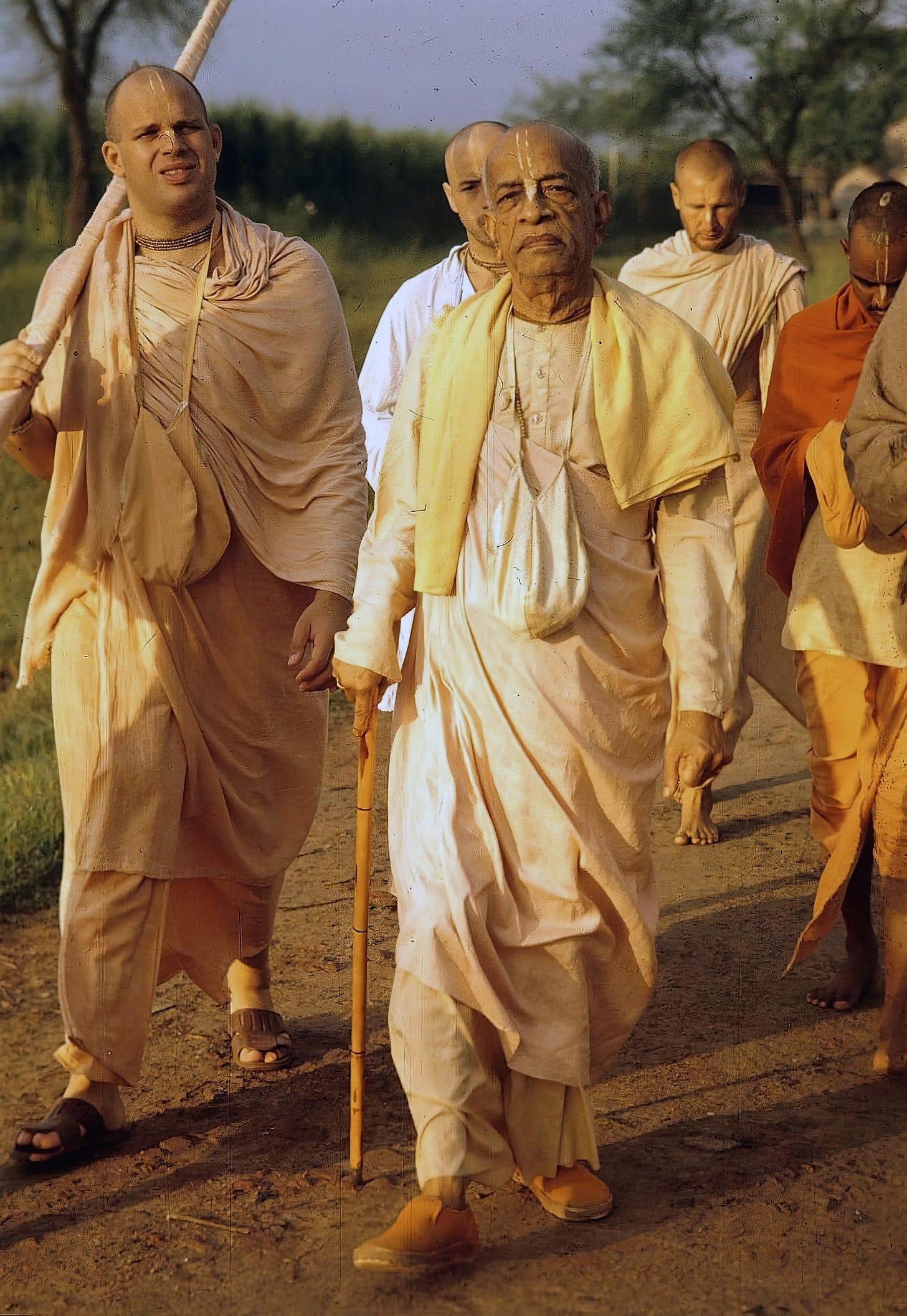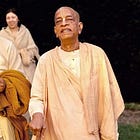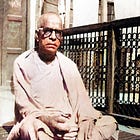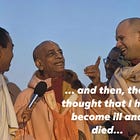The genius of Srila Prabhupada
There are many purports where Srila Prabhupada appears to go off-script and give a purport that appears to contradict what the verse says. A closer examination shows it is not the case.
There are many purports where Srila Prabhupada appears to go off-script and give an explanation that differs or sometimes even appears to contradict what the verse says. However, when we dive deep into the commentaries of previous acaryas, as well as other passages, we see that in reality, Prabhupada reveals the deeper meaning of the passages, which are usually very well hidden in the aphorisms of the text.
Here is one example.
In the 28th chapter of the 4th canto of Srimad Bhagavatam, we have the passage describing how Pyurañjana, after a life of material enjoyment, was reborn as a woman, the princess Vaidarbi, the daughter of King Vidarbha. When the time came, she was married to Malayadhvaja and begot several children.
This is the passage:
"It was fixed that Vaidarbhī, daughter of King Vidarbha, was to be married to a very powerful man, Malayadhvaja, an inhabitant of the Pāṇḍu country. After conquering other princes, he married the daughter of King Vidarbha.
King Malayadhvaja fathered one daughter, who had very black eyes. He also had seven sons, who later became rulers of that tract of land known as Draviḍa. Thus there were seven kings in that land.
My dear King Prācīnabarhiṣat, the sons of Malayadhvaja gave birth to many thousands and thousands of sons, and all of these have been protecting the entire world up to the end of one Manu’s life span and even afterward.
The great sage named Agastya married the first-born daughter of Malayadhvaja, the avowed devotee of Lord Kṛṣṇa. From her one son was born, whose name was Dṛḍhacyuta, and from him another son was born, whose name was Idhmavāha.
After this, the great saintly King Malayadhvaja divided his entire kingdom among his sons. Then, in order to worship Lord Kṛṣṇa with full attention, he went to a solitary place known as Kulācala.
Just as the moonshine follows the moon at night, immediately after King Malayadhvaja departed for Kulācala, his devoted wife, whose eyes were very enchanting, followed him, giving up all homely happiness, despite family and children." (SB 4.28.31-34)
The text appears to be easy enough, just a description of the descendants of a pious king. The seven sons became kings and fathered many thousands of sons, who protected the whole world, until the end of the manvantara, and even afterwards. The daughter, on the other hand, married the sage Agastya, who also fathered a son. Being thus successful in his family life, Malayadhvaja divided his kingdom between his sons and departed to a hermitage in the Kulā mountain to practice austerities in the final stage of his life. The devoted Vaidarbhī followed him, determined to continue her service to her husband up to the end.
Srila Prabhupada, however, adds a completely new layer of understanding to the passage, showing how the allegory describes the spread of the cult of bhakti, and how Vaidarbhī became involved in it as a result of her piety in the previous life as Purañjana. This meaning was first revealed by Srila Baladeva Vidyābhūṣaṇa in his commentary, and Prabhupada further expanded it to our contemporary context.
According to his explanation, Malayadhvaja was not just a powerful king, but also a great devotee. Text 4.28.29 reads:
upayeme vīrya-paṇāṁ, vaidarbhīṁ malayadhvajaḥ
yudhi nirjitya rājanyān, pāṇḍyaḥ para-purañjayaḥ
Srila Baladeva Vidyābhūṣaṇa reads the word malayadhvajaḥ as the combination of Malaya (the mountain range famous for the sandalwood trees) and dhvaja (war-flag). He thus depicts Malayadhvaja as a mahā-bhāgavata preacher, the learned devotee (pāṇḍyaḥ) who defeats non-devotional doctrines and conquers the transcendental city (Vaikuṇṭha) by the power of his devotional love (vīrya-paṇāṁ). Malayadhvaja is thus the emblem of the supremacy of bhakti over karma and jñana.
Srila Prabhupada translates the verse according to the commentary of Srila Sridhara Swami, but adds the explanation of Srila Baladeva Vidyābhūṣaṇa in his purport:
"The name Malayadhvaja signifies a great devotee who stands as firm as Malaya Hill and, through his propaganda, makes other devotees similarly as firm. Such a mahā-bhāgavata can prevail over the opinions of all others. A strong devotee makes propaganda against all other spiritual conceptions, namely jñāna, karma and yoga. With his devotional flag unfurled, he always stands fast to conquer other conceptions of transcendental realization. Whenever there is an argument between a devotee and a nondevotee, the pure, strong devotee comes out victorious.
The word pāṇḍya comes from the word paṇḍā, meaning “knowledge.” Unless one is highly learned, he cannot conquer nondevotional conceptions. The word para means “transcendental,” and pura means “city.” The para-pura is Vaikuṇṭha, the kingdom of God, and the word jaya refers to one who can conquer. This means that a pure devotee, who is strong in devotional service and who has conquered all nondevotional conceptions, can also conquer the kingdom of God. In other words, one can conquer the kingdom of God, Vaikuṇṭha, only by rendering devotional service. The Supreme Personality of Godhead is called ajita, meaning that no one can conquer Him, but a devotee, by strong devotional service and sincere attachment to the Supreme Personality of Godhead, can easily conquer Him. Lord Kṛṣṇa is fear personified for everyone, but He voluntarily agreed to fear the stick of mother Yaśodā. Kṛṣṇa, God, cannot be conquered by anyone but His devotee. Such a devotee kindly married the daughter of King Vidarbha."
We can see that Prabhupada was able to capture the essence of the commentary of Srila Baladeva Vidyābhūṣaṇa, and expand it, adding details and making it easy to understand. That's the same magic he does in other purports. From here, he continues to follow the explanation of Sri Baladeva and further expands it.
Text 4.28.30 reads:
tasyāṁ sa janayāṁ cakra, ātmajām asitekṣaṇām
yavīyasaḥ sapta sutān, sapta draviḍa-bhūbhṛtaḥ
The daughter fathered by Malayadhvaja had very black eyes (asitekṣaṇām). This means that her eyes were always fixed on Krsna. Apart from this girl, they had seven very powerful sons (yavīyasaḥ sapta sutān), who represent seven of the nine processes of devotional service (hearing, chanting, remembering, offering worship, offering prayers, rendering transcendental loving service, and serving the lotus feet of the Lord). This indicates that by the association with the king and surrounded by devoted children, Purañjana, now as Vaidarbhī, practiced devotional service. The other two processes (friendship and surrendering everything to the Lord) come later, as one perfects the first seven processes. This also comes from the commentary of Srila Baladeva Vidyābhūṣaṇa, with Prabhupada expanding his explanation.
Prabhupada explains all these ideas in detail in his purport:
"King Malayadhvaja was a great devotee, and after he married the daughter of King Vidarbha, he gave her one nice daughter, whose eyes were black. Figuratively this means that the daughter of King Malayadhvaja was also bestowed with devotional service, for her eyes were always fixed on Kṛṣṇa. A devotee has no vision in his life other than Kṛṣṇa. The seven sons are the seven processes of devotional service — hearing, chanting, remembering, offering worship, offering prayers, rendering transcendental loving service and serving the lotus feet of the Lord. Of the nine types of devotional service, only seven were immediately given. The balance — friendship and surrendering everything — were to be developed later. In other words, devotional service is divided into two categories, namely vidhi-mārga and rāga-mārga. The process of becoming friends with the Lord and sacrificing everything for Him belongs to the category of rāga-mārga, the stage of developed devotional service. For the neophyte, the important processes are those of hearing and chanting (śravaṇaṁ kīrtanam), remembering Kṛṣṇa, worshiping the Deity in the temple, offering prayers, always engaging in the service of the Lord, and worshiping the lotus feet of the Lord.
The word yavīyasaḥ indicates that these processes are very powerful. After a devotee engages in the processes of śravaṇaṁ kīrtanaṁ viṣṇoḥ smaraṇaṁ pāda-sevanam/ arcanaṁ vandanaṁ dāsyam, and is able to secure these processes, he can later become a devotee capable of rendering spontaneous devotional service, namely sakhyam and ātma-nivedanam. Generally the great ācāryas who preach devotional service all over the world belong to the category of sakhyam ātma-nivedanam. A neophyte devotee cannot actually become a preacher. The neophyte is advised to execute devotional service in the seven other fields (śravaṇaṁ kīrtanam, etc.). If one can successfully execute the preliminary seven items, he can in the future be situated on the platform of sakhyam ātma-nivedanam."
The verse also describes that these seven sons became rulers of the Draviḍa province (South India). Prabhupada connects this with the recent history of South India, with the appearance of many great ācāryas, and generations of devotees in many different sampradāyas very strongly practicing the seven preliminary processes of bhakti, paving thus the way for the appearance of Sri Caitanya Mahāprabhu, who made available the final two processes.
"The specific mention of Draviḍa-deśa refers to the five Draviḍa-deśas in South India. All are very strong in rendering the preliminary devotional processes (śravaṇaṁ kīrtanam). Some great ācāryas, like Rāmānujācārya and Madhvācārya, also came from Draviḍa-deśa and became great preachers. They were all situated on the platform of sakhyam ātma-nivedanam."
This interpretation is later confirmed by Śukadeva Goswami on SB 11.5.38-40:
"My dear King, the inhabitants of Satya-yuga and other ages eagerly desire to take birth in this Age of Kali, since in this age there will be many devotees of the Supreme Lord, Nārāyaṇa. These devotees will appear in various places but will be especially numerous in South India. O master of men, in the Age of Kali those persons who drink the waters of the holy rivers of Draviḍa-deśa, such as the Tāmraparṇī, Krtamālā, Payasvinī, the extremely pious Kāverī and the Pratīcī Mahānadī, will almost all be purehearted devotees of the Supreme Personality of Godhead, Vāsudeva."
And, of course, the appearance of Sri Caitanya Mahāprabhu is predicted on SB 11.5.32, 36, and 37:
"In the Age of Kali, intelligent persons perform congregational chanting to worship the incarnation of Godhead who constantly sings the names of Kṛṣṇa. Although His complexion is not blackish, He is Kṛṣṇa Himself. He is accompanied by His associates, servants, weapons and confidential companions.
Those who are actually advanced in knowledge are able to appreciate the essential value of this Age of Kali. Such enlightened persons worship Kali-yuga because in this fallen age all perfection of life can easily be achieved by the performance of saṅkīrtana.
Indeed, there is no higher possible gain for embodied souls forced to wander throughout the material world than the Supreme Lord’s saṅkīrtana movement, by which one can attain the supreme peace and free oneself from the cycle of repeated birth and death."
Just as this passage from the 11th canto, texts 4.28.29-34 of the allegory of Purañjana predict the spread of Vaiṣṇavism in South India, the appearance of Sri Caitanya Mahāprabhu, the spread of His Saṅkīrtana movement, and the distribution of the fruits of love of Godhead.
This is yet another example of how the verses of the scriptures hide meanings winch are revealed only by self-realized ācāryas. The ones who reject these conclusions and want instead to find direct quotes of everything, remain stuck in a very primitive understanding of the scriptures.
Text 4.28.31 continues the description and predicts the appearance of the International Society for Krsna Consciousness and the spread of the Saṅkīrtana movement in the western countries:
ekaikasyābhavat teṣāṁ, rājann arbudam arbudam
bhokṣyate yad-vaṁśa-dharair, mahī manvantaraṁ param
Malayadhvaja was a great preacher who enforced the supremacy of bhakti over the processes of fruitive activity and mental speculation. He had seven sons (or disciples) who propagated the process of devotional service in South India. Each of them had millions of other descendants (ekaikasyābhavat teṣāṁ, rājann arbudam arbudam, each one produced ten million descendants), who have been protecting the whole world, or in other words, spreading the process of devotional service up to the end of the manvantara, and beyond (bhokṣyate yad-vaṁśa-dharair, mahī manvantaraṁ param).
Prabhupada connects the mention of the Manus and Manvantaras in the text with the continuous process of devotional service being spread by the Manus and their descendants throughout the universe ("As one Manu follows another, the cult of Kṛṣṇa consciousness is being imparted"). The seven sons becoming the kings of South India was already connected connected with our previous ācāryas spreading Vaiṣṇavism and the process of worship of the Lord, and now the spread of the Saṅkīrtana movement out of India, and it's continuation, not only on Earth, but in other parts of the cosmos is predicted. One may think this is too far out, but again, these same details are also described in the 11th canto and other scriptures. Prabhupada is thus just making apparent the deeper meaning of the text.
As he explains in his purport to text 31:
"Among Vaiṣṇavas there may be some difference of opinion due to everyone’s personal identity, but despite all personal differences, the cult of Kṛṣṇa consciousness must go on. We can see that under the instructions of Śrīla Bhaktivinoda Ṭhākura, Śrīla Bhaktisiddhānta Sarasvatī Gosvāmī Mahārāja began preaching the Kṛṣṇa consciousness movement in an organized way within the past hundred years. The disciples of Śrīla Bhaktisiddhānta Sarasvatī Gosvāmī Mahārāja are all godbrothers, and although there are some differences of opinion, and although we are not acting conjointly, every one of us is spreading this Kṛṣṇa consciousness movement according to his own capacity and producing many disciples to spread it all over the world. As far as we are concerned, we have already started the International Society for Krishna Consciousness, and many thousands of Europeans and Americans have joined this movement. Indeed, it is spreading like wildfire. The cult of Kṛṣṇa consciousness, based on the nine principles of devotional service (śravaṇaṁ kīrtanaṁ viṣṇoḥ smaraṇaṁ pāda-sevanam/ arcanaṁ vandanaṁ dāsyaṁ sakhyam ātma-nivedanam), will never be stopped. It will go on without distinction of caste, creed, color or country. No one can check it.
The word bhokṣyate is very important in this verse. Just as a king gives protection to his citizens, these devotees, following the principles of devotional service, will give protection to all the people of the world. The people of the world are very much harassed by so-called religious-principled svāmīs, yogīs, karmīs and jñānīs, but none of these can show the right way to become elevated to the spiritual platform. There are primarily four parties spreading devotional service all over the universe. These are the Rāmānuja sampradāya, the Madhva sampradāya, the Viṣṇusvāmi sampradāya and the Nimbārka sampradāya. The Madhva-Gauḍīya sampradāya in particular comes from Lord Caitanya Mahāprabhu. All these devotees are spreading this Kṛṣṇa consciousness movement very widely and giving protection to innocent people who are being so much embarrassed by pseudo-avatāras,-svāmīs, -yogīs and others."
Text 4.28.32 reads:
agastyaḥ prāg duhitaram, upayeme dhṛta-vratām
yasyāṁ dṛḍhacyuto jāta, idhmavāhātmajo muniḥ
In the allegory, the daughter of Malayadhvaja represents the very plant of bhakti, the bhakti-latā-bīja, which sprouts in the heart of the king and grows supported by the seven brothers, the seven processes of devotional service practiced by him. The girl married Agastya, who is defined by Baladeva Vidyābhūṣaṇa as the mind, illustrating how devotion conquered the very mind of the king, making him fully fixed in the service of the Lord.
The girl later gave birth to a son called Dṛḍhacyuta, from whom a grandson called Idhmavāha, which means disciples who gather sacrificial wood (idhmavāha) for burning in sacrifices when approaching a spiritual master. This indicates that due to the devotion of Malayadhvaja, all his descendants were also great devotees.
As Prabhupada explains:
"The name Agastya Muni is very significant. Agastya Muni represents the mind. The word agastya indicates that the senses do not act independently, and the word muni means “mind.” The mind is the center of all the senses, and thus the senses cannot work independent of the mind. When the mind takes to the cult of bhakti, it engages in devotional service. The cult of bhakti (bhakti-latā) is the first daughter of Malayadhvaja, and as previously described, her eyes are always upon Kṛṣṇa (asitekṣaṇām). One cannot render bhakti to any demigod. Bhakti can be rendered only to Viṣṇu (śravaṇaṁ kīrtanaṁ viṣṇoḥ). Thinking the Absolute Truth to be without form, the Māyāvādīs say that the word bhakti can apply to any form of worship. If this were the case, a devotee could imagine any demigod or any godly form and worship it. This, however, is not the real fact. The real fact is that bhakti can be applied only to Lord Viṣṇu and His expansions. Therefore bhakti-latā is dṛḍha-vrata, the great vow, for when the mind is completely engaged in devotional service, the mind does not fall down. If one tries to advance by other means — by karma-yoga or jñāna-yoga — one will fall down, but if one is fixed in bhakti, he never falls down.
Thus from bhakti-latā the son Dṛḍhacyuta is born, and from Dṛḍhacyuta the next son, Idhmavāha, is born. The word idhma-vāha refers to one who carries wood for burning in a sacrifice when approaching a spiritual master. The point is that bhakti-latā, the cult of devotion, fixes one in his spiritual position. One so fixed never comes down, and he begets children who are strict followers of the śāstric injunctions. As said in the Vedas:
tad-vijñānārthaṁ sa gurum evābhigacchet
samit-pāṇiḥ śrotriyaṁ brahma-niṣṭhamIn the line of devotional service, those who are initiated are strict followers of the Vedic scriptural injunctions."
Text 4.28.33 reads:
vibhajya tanayebhyaḥ kṣmāṁ, rājarṣir malayadhvajaḥ
ārirādhayiṣuḥ kṛṣṇaṁ, sa jagāma kulācalam
This last verse describes the process of retirement of the king, who divided his kingdom amongst his sons (vibhajya tanayebhyaḥ kṣmāṁ) and retired to a secluded place, desiring to worship the Lord in full attention.
This is connected by both Baladeva and Prabhupada with the retirement of the spiritual master after his disciples are mature, and the duty of the disciples in continuing the mission of the spiritual master in spreading Krsna Consciousness, instead of succumbing to an easy life of solitary, superficial meditation, devoid of responsibility.
As he wrote in his purport:
"Malayadhvaja, the great king, was certainly a mahā-bhāgavata, topmost devotee. By executing devotional service, he begot many sons and disciples for propagating the bhakti cult (śravaṇaṁ kīrtanaṁ viṣṇoḥ). Actually, the entire world should be divided among such disciples; everyone should be engaged in preaching the cult of Kṛṣṇa consciousness. In other words, when disciples are grown up and are able to preach, the spiritual master should retire and sit down in a solitary place to write and execute nirjana-bhajana. This means sitting silently in a solitary place and executing devotional service. This nirjana-bhajana, which is the silent worship of the Supreme Lord, is not possible for a neophyte devotee. Śrīla Bhaktisiddhānta Sarasvatī Ṭhākura never advised a neophyte devotee to go to a solitary place to engage in devotional service. Indeed, he has written a song in this connection:
duṣṭa mana, tumi kisera vaiṣṇava? pratiṣṭhāra tare, nirjanera ghare, tava hari-nāma kevala kaitava
“My dear mind, what kind of devotee are you? Simply for cheap adoration you sit in a solitary place and pretend to chant the Hare Kṛṣṇa mahā-mantra, but this is all cheating.” Thus Bhaktisiddhānta Sarasvatī Ṭhākura advocated that every devotee, under the guidance of an expert spiritual master, preach the bhakti cult, Kṛṣṇa consciousness, all over the world. Only when one is mature can he sit in a solitary place and retire from preaching all over the world. Following this example, the devotees of the International Society for Krishna Consciousness now render service as preachers in various parts of the world. Now they can allow the spiritual master to retire from active preaching work. In the last stage of the spiritual master’s life, the devotees of the spiritual master should take preaching activities into their own hands. In this way the spiritual master can sit down in a solitary place and render nirjana-bhajana."
The passage is concluded on text 4.28.34, which reads:
hitvā gṛhān sutān bhogān, vaidarbhī madirekṣaṇā
anvadhāvata pāṇḍyeśaṁ, jyotsneva rajanī-karam
When Malayadhvaja retired to the forest, Vaidarbhī also left home to serve him. The verse describes her as madira-īkṣaṇā (with enchanting eyes). Prabhupada explains that another meaning of madira is "intoxicating", which means that her eyes were enchanting because, due to the association of such an exalted Vaiṣnava, she would become intoxicated in love of Godhead upon seeing the Deity. In other words, by this stage, she had become an exalted devotee, just like her husband. Vaidarbhī thus represents the disciple, who advances by association and service to the spiritual master.
In the previous verse, the seven sons of Malayadhvaja represent the senior disciples who preach, and thus inherit the mission of spreading Krsna Consciousness, after the guru, in his old age, retires to fix his mind on the Lord, while Vaidarbhī represents the disciples who stay with the spiritual master to serve him at the last stage.
As Prabhupada explains:
"Just as in the vānaprastha stage the wife follows the husband, similarly when the spiritual master retires for nirjana-bhajana, some of his advanced devotees follow him and engage in his personal service. In other words, those who are very fond of family life should come forward in the service of the spiritual master and abandon so-called happiness afforded by society, friendship and love. A verse by Śrīla Viśvanātha Cakravartī Ṭhākura in his Gurv-aṣṭaka is significant in this regard: yasya prasādād bhagavat-prasādaḥ. A disciple should always remember that by serving the spiritual master he can easily advance in Kṛṣṇa consciousness. All the scriptures recommend that it is by pleasing the spiritual master and serving him directly that one can attain the highest perfectional stage of devotional service."
In this way, this passage details the whole master plan conceived by Srila Prabhupada and the previous ācāryas for taking us out of the material ocean, attracting the mercy of the Lord by participating in His mission of propagating Krsna Consciousness and thus saving more and more souls from the calamity of conditioned existence.
Read also:
If you read this article to the end, give it a like. This makes Substack recommend it to more people.






All gloreis to Srila Prabhupada! Thank you. 😊